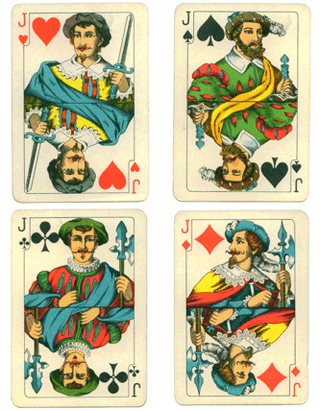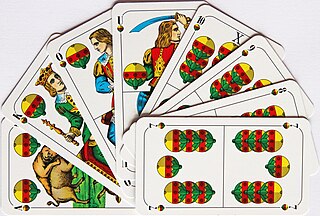
Skittles is a historical lawn game and target sport of European origin, from which the modern sport of nine-pin bowling is descended. In regions of the United Kingdom and Ireland the game remains as a popular indoor pub game.

Ripuarian is a German dialect group, part of the West Central German language group. Together with the Moselle Franconian which includes the Luxembourgish language, Ripuarian belongs to the larger Central Franconian dialect family and also to the Rhinelandic linguistic continuum with the Low Franconian languages.

Skittles are multicolored fruit-flavored lentil-shaped candies produced and marketed by the Wrigley Company, a division of Mars, Inc.
The early Germanic calendars were the regional calendars used among the early Germanic peoples before they adopted the Julian calendar in the Early Middle Ages. The calendars were an element of early Germanic culture.

A pub game is one which is traditionally played inside or outside a pub. Most pub games date back centuries and are rooted in village culture. Many derive from older outdoor sports.

Table skittles is a game in which a ball or spinning top is used to knock over skittles on a small board, usually placed on a table. Table skittles are almost always made of wood.

Wilhelm Bacher was a Jewish Hungarian scholar, rabbi, Orientalist and linguist, born in Liptó-Szent-Miklós, Hungary to the Hebrew writer Simon Bacher. Wilhelm was himself a prolific writer, authoring or co-authoring approximately 750 works. He was a contributor to many encyclopedias, and was a major contributor to the landmark Jewish Encyclopedia throughout all its 12 volumes. Although almost all of Bacher's works were written in German or Hungarian, at the urging of Hayyim Nahman Bialik many were subsequently translated into Hebrew by Alexander Siskind Rabinovitz.
Sigmund Feist was a German Jewish pedagogue and historical linguist. He was the author of the Germanic substrate hypothesis as well as a number of important works concerning Jewish ethnic and racial identity. Feist served as the director of the Jewish Reichenheim Orphanage in Berlin from 1906 to 1935. In 1907 he became a member of the Gesellschaft der Freunde society.
The Österreichisches Wörterbuch, abbreviated ÖWB, is the official spelling dictionary of Standard High German in Austria, i.e. of Austrian. It is edited by a group of linguists under the authority of the Austrian Federal Ministry of Education, Arts and Culture and contains a number of terms unique to Austrian German or that are more frequently used or differently pronounced there. A considerable amount of this "Austrian" vocabulary is also common in Southern Germany, especially Bavaria, and some of it is used in Switzerland as well. The most recent edition is the 43rd from 2017. Since the 39th edition from 2001 the orthography of the ÖWB was adjusted to the German spelling reform of 1996.

The Hessian Skittles are a group of nine extinct volcanoes in the northwestern and lowest part of the Rhön Mountains in East Hesse, Germany. This striking collection of domed hills or kuppen is located in the counties of Hersfeld-Rotenburg and Fulda in the northwestern part of the Kuppen Rhön east of Eiterfeld and south of Schenklengsfeld.

Grobhäusern, also Grobhaus, is an historical German vying game in which players bet and then compare their 4-card combinations. It is played by two to eight players using a 32-card piquet pack. The game was illegal in most places. It was popular in rural Upper Saxony in the late 18th century. A variant played in Danubian Austria-Hungary was Färbeln.
Scherwenzel or Scharwenzel is a 16th century, German, gambling game played with cards and named after the Unters or Jacks that had special privileges. It appears to have been an elaboration of Grobhäusern or Färbeln played in Germany, Poland, Silesia and Bohemia, but especially in Bavaria in which the Unters were variously known as Scharwenzels, Scherwenzels, Scherers or Wenzels. They, and to some extent also the Nines, functioned as wildcards. According to Adelung, Grobhäusern, on which it was based, was "far simpler than Scherwenzeln".

Michael Schanze is a German television presenter and singer.

Schweizerisches Idiotikon is an ongoing, major project of lexicography of the Swiss German dialects. Publication began in 1881 and is projected to be complete by 2022. Its scope includes the language since the end of the classical Middle High German period and as such also represents the historical dictionary of the dialects of German-speaking Switzerland, and is one of the most detailed treatments of the Early Modern High German language in general. As of 2010, it contains 150,000 words.

Industrie und Glück is a pattern of French suited playing cards used to play tarock. The name originates from an inscription found on the second trump card. This deck was developed during the nineteenth century in the Austro-Hungarian Empire. The earliest known examples were made in Vienna in 1815. After the collapse of the empire in World War I, it remained the most widely used tarot deck in Central Europe and can be found throughout the former parts of the empire.

A Landesburg or landesherrliche Burg was a castle that a territorial lord, such as a prince-bishop, duke or prince built for the defence or expansion of his sovereign estates. They were thus the central and most important castles of the great princely territories. The Landesburgen were usually the property of the territorial lord, but they sometimes referred to castles that he did not own, but were available to him as a safe house (Offenhaus). The large castles of the 8th to 10th centuries, east of the Rhine and outside the towns were often described as Landesburgen because they performed important functions in the control of the state.

The Deuce is the playing card with the highest value in German card games. It may have derived its name from dice games in which the face of the die with two pips is also called a Daus in German.

Bolachen is a traditional card game for 3 players that is played in parts of southern Upper Bavaria, especially in the Rupertiwinkel area of the Berchtesgaden Land, where there is a cultural influence from Salzburg, and the state of Salzburg itself. It is a Bavarian variant of the more complex, old Austrian game of Préférence. Like its Bavarian cousin, Wallachen, Bolachen is threatened by extinction.
Elmar Seebold is a German philologist who specializes in Germanic philology. From 1971 to 1983, Seebold was Professor of Germanic philology at the University of Fribourg. He then transferred to the Ludwig Maximilian University of Munich. Seebold retired from the university in 1999. He is the editor of the Etymological Dictionary of the German Language.
Saunigl or Saunigeln was a 19th-century Austrian card game of the shedding type in which the last player left with cards was the Saunigel and risked suffering a beating by the first player out. It may be related to modern Fingerkloppe in which losers also receive a physical punishment, albeit on a lesser scale.














